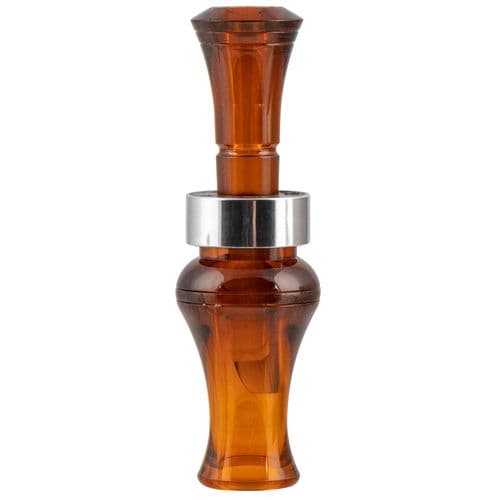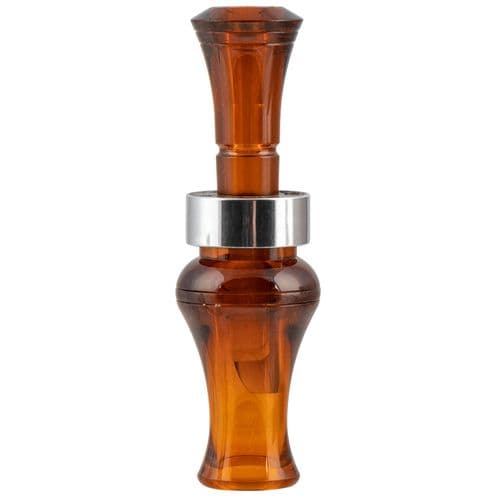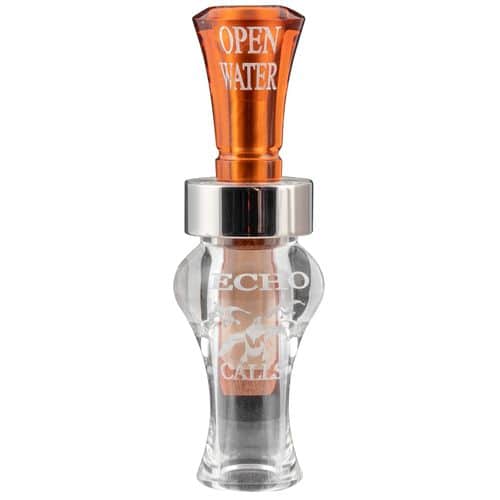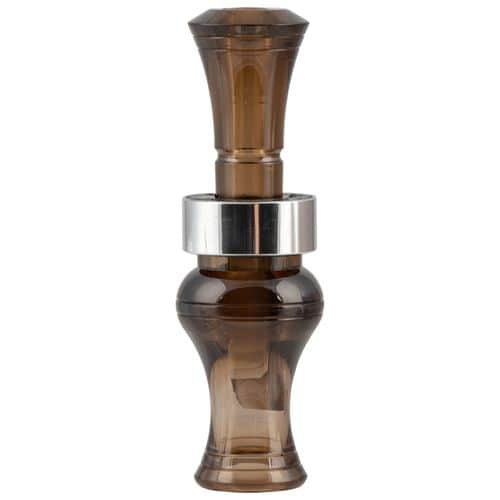
ECHO CALLS, INC 77802 Open Water Double Reed Bourbon Polycarbonate Molded
$22.19
Please Allow 4-5 Business Days for In Store Pickup

The ECHO CALLS Open Water Double Reed Duck Call: Mastering Big Water
When the vast expanse of open water calls, demanding a duck call that can cut through the wind and reach distant flocks, serious waterfowl hunters need an instrument that combines power, versatility, and unwavering reliability. For those asking, "What's the ultimate duck call for big water hunting?" or "How can I improve my success rate on large lakes and reservoirs?", the answer frequently points to a call specifically engineered for such challenging environments. The ECHO CALLS Open Water Double Reed Duck Call, crafted from durable Bourbon Polycarbonate, stands as a prime example of a tool designed to meet these exact needs, empowering hunters to mimic the nuanced language of waterfowl with compelling realism.
This meticulously molded call is a quintessential choice for the dedicated duck hunter. It's built not just to produce sound, but to replicate the authentic vocalizations of various duck species, particularly mallards, in settings where sound projection and clarity are paramount. Whether you're targeting green-winged teal hidden in the reeds, drawing down a high-flying flock of pintails, or coaxing wary mallards into your decoy spread, the Echo Calls Open Water Double Reed delivers the performance required. It's specifically for hunters who navigate the complexities of vast marshlands, expansive lakes, and powerful river systems, where calls need to carry over significant distances without losing their lifelike quality.
Why Choose a Double Reed Duck Call for Open Water?
For many waterfowl hunters, the choice between a single reed and a double reed call is a critical decision, often dictated by hunting conditions and desired sound versatility. A double reed system, as featured in the Echo Calls Open Water model, offers distinct advantages, especially when operating in open water scenarios.
- Exceptional Versatility: The primary benefit of a double reed call is its ability to produce a wider spectrum of sounds with less air pressure compared to some single reeds, while still offering excellent control. This means hunters can easily transition from a loud, attention-grabbing hail call to a soft, subtle feeder chuckle without significant effort. For the experienced hunter looking to entice a diverse range of ducks, or for the developing caller seeking a more forgiving instrument, this versatility is invaluable.
- Realistic Sound Replication: Double reeds are renowned for their ability to accurately mimic the raspy, natural sound of a mallard hen. This specific tonal quality is often harder to achieve consistently with single reeds, making double reeds a preferred choice for hunters focused on authentic mallard vocalizations. The Echo Calls Open Water Double Reed excels at producing these lifelike quacks, clucks, and greeting calls that are essential for drawing in educated birds.
- Ease of Use: While some perceive double reeds as less "loud" than single reeds, their inherent design often makes them more forgiving and easier to blow for new and intermediate callers. The two reeds work in concert to create the sound, providing a more stable platform for tone production and reducing the likelihood of "sticking" or producing an undesirable squeak, a common frustration with less stable calls. This ease of use translates directly into more confident and effective calling in the field.
- Controlled Volume: In open water, where sounds can dissipate quickly, a call that offers controlled volume without sacrificing realism is crucial. The Echo Calls Open Water Double Reed allows hunters to produce powerful, far-reaching calls when ducks are distant, and then quickly dial down the volume for soft, persuasive finishing calls as birds commit to the spread. This dynamic range is key to successful close-range decoying.
The "Open Water" Advantage: Designed for Distance and Clarity
The "Open Water" designation in the Echo Calls call's name is not merely a descriptor; it signifies a deliberate design philosophy aimed at performance in expansive environments.
- Enhanced Sound Projection: When hunting large bodies of water, sound needs to travel. The specific bore design and reed configuration of the Echo Calls Open Water call are optimized for maximum sound projection, ensuring your calls reach ducks flying high overhead or skirting the edges of a vast lake. This capability is vital for drawing attention from birds that might otherwise pass by unnoticed.
- Piercing Tones: The call is engineered to produce sharp, clear notes that cut through adverse conditions such as wind and chop. Unlike some calls that can sound muffled or lose definition over distance, the Echo Calls Open Water maintains its crispness, making it highly effective even when the weather isn't cooperating. This clarity is essential for ducks to accurately pinpoint the source of the sound.
- Targeting Wary Birds: Ducks that frequent open water environments are often highly pressured and wary. They've heard countless calls and are quick to detect anything unnatural. The ability of this call to produce incredibly lifelike, nuanced sounds helps to overcome this wariness, convincing even the most educated birds that a safe landing zone awaits.
The Resilience of Bourbon Polycarbonate Molding
The material choice for a duck call is as important as its design, directly influencing its durability, sound consistency, and maintenance requirements. The Echo Calls Open Water Double Reed is molded from Bourbon Polycarbonate, a material celebrated for several key advantages:
- Unmatched Durability: Polycarbonate is an incredibly robust and impact-resistant polymer. Unlike wooden calls that can crack, swell, or warp with moisture and temperature fluctuations, or even acrylic calls which can be brittle, polycarbonate stands up to the rigors of hunting in harsh environments. Dropping it in the blind, exposing it to freezing temperatures, or enduring heavy rainfall won't compromise its structural integrity. This makes it an ideal choice for hunters who demand gear that performs flawlessly season after season.
- Consistent Performance: One of the greatest benefits of a molded polycarbonate call is its consistent sound. The material is not susceptible to the expansion and contraction caused by changes in humidity and temperature that can affect natural materials like wood. This means the call will sound the same whether it's a humid early season morning or a frigid late-season afternoon, providing a reliable performance every time you blow into it.
- Low Maintenance: Polycarbonate calls are exceptionally easy to clean and maintain. They can be rinsed with water, and their smooth, non-porous surface resists dirt and grime buildup. This low-maintenance aspect is a significant advantage for busy hunters who prefer spending more time in the field and less time on gear upkeep.
- Distinctive Aesthetic: The "Bourbon" finish adds a visually appealing and unique touch to the call. While primarily functional, the aesthetics of your gear can enhance your overall hunting experience, and the rich, warm tones of the Bourbon Polycarbonate give this call a distinctive look that stands out in the blind.
- Cost-Effectiveness: While offering premium performance and durability, polycarbonate calls generally present a more accessible price point compared to high-end acrylic or custom-made wooden calls. This makes the Echo Calls Open Water Double Reed an excellent value proposition for hunters seeking top-tier performance without breaking the bank.
Mastering Your Duck Call: Tips for Effective Communication
Owning a high-quality call like the Echo Calls Open Water Double Reed is the first step; mastering its use is the key to consistent success. Here are fundamental tips to help hunters become more effective communicators with waterfowl:
- Start with the Basic Quack: The foundation of all duck calling is the simple, realistic quack. Practice a short, sharp burst of air, exhaling from your diaphragm. Aim for a distinct "quack" sound, not a drawn-out "quaaack." Consistency in volume and tone is crucial.
- Learn the Greeting Call: Once you have the basic quack, combine several quacks into a realistic greeting call. This is typically a series of 5-7 rapidly descending quacks (e.g., "quack-quack-quack-quack-quack"). This call signifies "hello" to passing ducks and often grabs their attention.
- Practice the Comeback Call: When ducks are flying away or show hesitation, a loud, urgent comeback call can often turn them around. This is usually a series of loud, rapid quacks that sound desperate and enticing (e.g., "quack-quack-quack-QUACK-QUACK-QUACK!").
- Perfect the Feeder Chuckle: This is a crucial finishing call. It's a soft, contented series of short, choppy quacks or clucks (e.g., "tuk-tuk-tuk," or "dit-dit-dit"). It mimics ducks feeding contentedly on the water, signaling safety and enticing birds to commit to your spread. This call needs to sound soft and natural.
- Use Air from Your Diaphragm: Blowing from your throat or cheeks will result in weak, inconsistent calls. Always use air from your diaphragm (your stomach area) for powerful, sustained airflow and consistent sound production.
- Listen to Real Ducks: The best way to learn is by listening. Spend time observing ducks in their natural habitat or listen to high-quality recordings of wild duck sounds. Mimic what you hear, focusing on rhythm, tone, and inflection.
- Practice Consistently: Like any skill, duck calling requires regular practice. Even just 10-15 minutes a day can significantly improve your ability. Practice in various environments, even indoors, to get a feel for how your calls project.
- Read the Ducks: The most effective callers don't just blow calls; they read the ducks' reactions. If ducks respond positively, keep calling. If they seem wary or ignored your calls, change your tune or try a different call. Understanding when to call, and more importantly, when not to call, is a hallmark of an expert caller.
Key Considerations When Selecting a Duck Call
Beyond specific features, several overarching factors should guide a hunter's choice in a duck call. The Echo Calls Open Water Double Reed fits seamlessly into many of these considerations, making it a highly recommended option.
- Hunting Environment: As discussed, this call is optimized for open water, large lakes, and reservoirs where sound needs to travel far and cut through wind.
- Target Species: While versatile, its strong mallard hen realism makes it exceptional for attracting mallards and other puddle ducks.
- Skill Level: Its forgiving double-reed design makes it accessible for beginners, yet its responsiveness allows advanced callers to execute complex routines.
- Durability and Maintenance: For hunters who brave all weather conditions and demand reliability, the polycarbonate construction offers superior longevity and ease of care.
- Sound Range: The ability to produce both loud hail calls and soft finishing calls is critical, and this call delivers that dynamic range.
- Personal Preference: Ultimately, the best call feels comfortable in your hands and produces sounds that you feel confident in. The Echo Calls Open Water Double Reed's ergonomic design and consistent performance contribute to this feeling of confidence.
Maintaining Your Echo Calls Duck Call
Proper care ensures your call performs season after season. The robust nature of polycarbonate makes maintenance straightforward:
- Disassembly and Cleaning: The Echo Calls Open Water Double Reed is designed for easy disassembly. Gently separate the barrel from the insert.
- Rinse with Water: Rinse both components thoroughly with clean water, removing any saliva, dirt, or debris. For stubborn residue, a mild soap can be used, but ensure it's rinsed completely.
- Air Dry: Allow both parts to air dry completely before reassembling. This prevents moisture buildup, which can affect reed performance.
- Inspect Reeds: Periodically check the reeds for any signs of wear, nicks, or foreign material. While polycarbonate is durable, reeds can still accumulate residue over time.
- Proper Storage: Store your call in a clean, dry place, ideally in a call case or lanyard pouch, to protect it from impacts and extreme temperatures.
For hunters seeking to elevate their waterfowl pursuits, the ECHO CALLS Open Water Double Reed Duck Call in Bourbon Polycarbonate offers a compelling blend of design innovation, material resilience, and sonic excellence. It’s a tool that addresses the specific challenges of open water hunting, providing the clarity, projection, and versatile sound needed to bring ducks within range. This call is a testament to purposeful engineering, providing a reliable companion for countless sunrises spent in the marsh.
This exceptional waterfowl accessory, along with a comprehensive selection of premium hunting gear and expert advice, is readily available at DEGuns. DEGuns is committed to equipping hunters with the very best tools for their passion, ensuring that you are fully prepared for every outing.
| Feature | Description | Benefit |
|---|---|---|
| Type | Double Reed Duck Call | Versatile sounds, easier to blow, realistic mallard hen tones |
| Material | Bourbon Polycarbonate Molded | Extreme durability, consistent sound, weather resistant, low maintenance |
| Design Specialty | Open Water Optimized | Max sound projection, cuts through wind, effective for wary birds |
| Brand | ECHO CALLS, INC | Renowned for quality and performance in waterfowl calls |
| UPC | 643680778021 | Unique product identifier for easy lookup |
Specifications
Explore the specific details and characteristics
- SKU
- 77802
- UPC
- 643680778021
- MPN
- 77802







